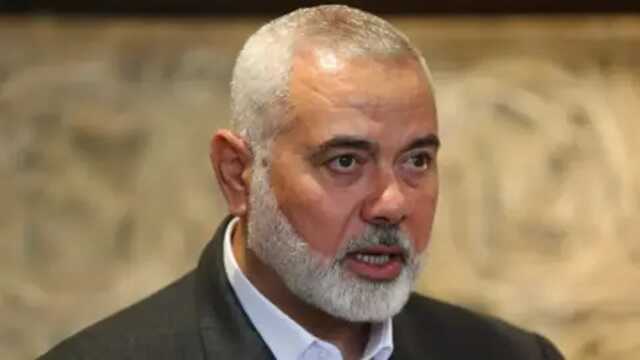Ismail Haniyeh’s death brings prospect of regional war closer
While Hamas’s capacity to retaliate is diminished, response could come from axis of militias backed by Iran
Like all prominent Hamas figures, Ismail Haniyeh lived under the constant threat of assassination; his death in the Iranian capital of Tehran in a reported missile strike appears to be the latest daring Israeli operation targeting its enemies around the world.
In the aftermath of the Palestinian militant group’s brutal 7 October attack, Israel’s prime minister, Benjamin Netanyahu, said Hamas’s leadership, including those outside the Gaza Strip, were “marked for death”.
The timing and location of Haniyeh’s killing, however, means it could be yet another destabilising factor in a conflict already on the verge of escalating into a regional war. Missteps in this choreography of airstrikes and targeted killings are an ever-present possibility, and the stakes keep getting higher.
Assassinating the head of Hamas’s political bureau is ostensibly a major morale boost for Israel, a boon for the unpopular Netanyahu, and a heavy blow to the Palestinian group.
After almost 10 months of fighting in Gaza, Israel had until now failed to take out Hamas’s top leaders: the mastermind of 7 October, Yahya Sinwar, is still at large in Gaza. It is also unclear whether a massive airstrike earlier this month targeting the group’s military commander, Mohammed Deif, was successful.
The Hamas official Moussa Abu Marzouk confirmed that Haniyeh had died during a visit to Tehran for the inauguration of the new Iranian president. Marzouk called the killing a “grave escalation” that “will not go unpunished”, although the Islamist movement’s capacity to respond is severely diminished after almost a year of war against Israeli forces in the Gaza Strip.
A response could instead come from Hamas’s allies, bringing the Middle East closer to a regional war between Israel and Iran and its proxies. Haniyeh’s death came just hours after Israel claimed it killed a top Hezbollah commander in the Lebanese capital, Beirut, and the region is already bracing for the powerful Shia militia’s reaction.
Israel and Hezbollah have been fighting a war of attrition on the blue line that separates Lebanon and the Jewish state since Hezbollah joined the fighting on 8 October, and tensions have soared since an airstrike on Saturday that killed 12 children in the Israeli-controlled Golan Heights. Hezbollah has denied it was responsible for the attack.
Unable to protect one of its most important allies on its own soil, Iran needs to save face. A spokesperson for Iran’s supreme national security council said early on Wednesday that the perpetrators of the Tehran attack would receive “a response”, according to Lebanese network Al-Mayadeen.
Iranian state television also said the assassination would prompt “retaliation” from the Shia axis of militias around the Middle East backed by Iran. Several of these proxies, including Yemen’s Houthis, have already fired missiles and drones at Israel and US assets in the region over the last nine months, ostensibly to aid Hamas’s war effort.
The people of Gaza and Israeli hostages held in Hamas’s tunnels are the immediate victims here because a breakthrough in the protracted ceasefire talks is now even less likely.
As the head of the group’s politburo, based in the Qatari capital of Doha, Haniyeh was a key figure in talks mediated by Egypt, Qatar and the US aimed at a lasting ceasefire and hostage and prisoner release deal. Iranian state television said that Haniyeh’s death would delay the negotiations by “several months”.
While Hamas is used to having to replace and promote new leaders in the wake of Israeli assassinations, the loss of a globally famous figure such as Haniyeh will have a major operational impact. The 62-year-old Hamas veteran managed the movement’s relationships with allies in Tehran and around the region, including Hezbollah.
The politburo leader was also widely considered to be more pragmatic and open to negotiation with Israel than hardliners such as Sinwar, the group’s leader in Gaza.
Haniyeh was an early advocate inside Hamas for political and diplomatic efforts alongside armed resistance, and adopted his predecessor’s revised 2017 charter, which implicitly accepted the existence of Israel.
The 7 October assault was carried out partly in response to hardening attitudes towards the Palestinians in Israel as the country shifted to the right politically. It has led inevitably to intense scrutiny of Hamas’s apparent previous willingness to pursue a diplomatic solution to the conflict.
How much Haniyeh knew about the attack beforehand is not clear, although he was quick to champion it. His removal is unlikely to prompt the group to move towards a more propitiatory position.
Bethan McKernanin Jerusalem
Source: theguardian
Read more similar news:
Comments:
comments powered by Disqus


































